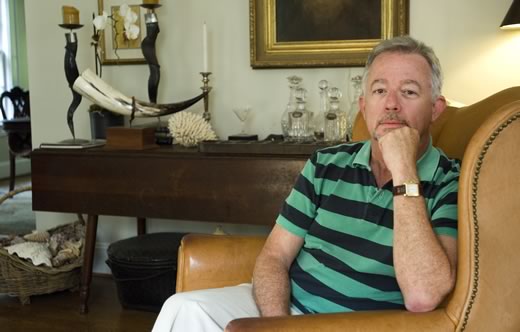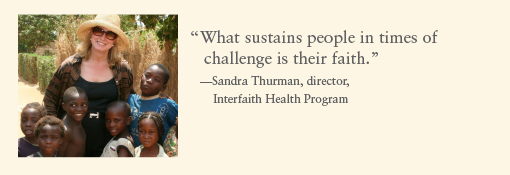A powerful friendship

by Martha Nolan McKenzie
Joseph Blount puts his faith in Sandra Thurman and the RSPH to address the challenges of global health
|
|
When Sandra Thurman joined the Hubert Department of Global Health in 2006, she brought with her unparalleled expertise in AIDS, connections with leaders like former South African president Nelson Mandela, and best wishes from friends like Joseph W. Blount. The latter recently proved to be a true friend indeed, when Blount, a philanthropist and AIDS activist, pledged $2 million to support Thurman's work.
Blount's largess comes as Thurman steps into a new role as director of the Interfaith Health Program (IHP) and establishes the Joseph W. Blount Global Health and Society Program. "The gift was not tied to my joining the Interfaith Health Program, but it was a nice fit," says Thurman, who also directs the International AIDS Trust (IAT) at the RSPH. "It gives me the opportunity to pursue the connection between faith and health, as well as look at global justice and social issues pertaining to women's health and HIV and AIDS. Joe and I both have a keen interest in all of these issues."

Their relationship grew from seeds planted in the mid-1980s, though they met a decade before. Their friendship deepened when many of their gay friends fell ill with the disease that came to be known as AIDS.
At the outset of the epidemic, Thurman and Blount became involved with the grassroots nonprofit AID Atlanta—Thurman first as a hospice volunteer and later as director and Blount as financial supporter. "AID Atlanta was in a precarious position with their finances when Sandy joined the organization," says Blount. "I became her 'groupie' and supported her every effort in making AID Atlanta one of the most respected community AIDS organizations in the country."
Following AID Atlanta, Thurman served with the Task Force for Child Survival and Development and then directed the Office of National AIDS Policy in the Clinton White House. When Clinton left office, many of the AIDS programs were shifted to IAT, led by Thurman in Washington and now at the RSPH.
Blount supported Thurman each step of the way and even encouraged her to go back to school to get a theology degree.
"When I started my work in HIV/AIDS as a hospice volunteer, I learned that it's impossible to separate people's health from their spiritual life," says Thurman. "What sustains people in times of challenge, particularly around end-of-life issues and chronic illness, is their faith. So much of Joe's generosity is grounded in the tenants of his faith. We resonate in that way."
When Thurman returned to Atlanta with IAT, she and Blount began to discuss the possibility of an endowment to support her ongoing work on HIV/AIDS and the connection between faith and health. The $2 million gift, creating the Joseph W. Blount Global Health and Society Program, was formalized earlier this year.
With Blount's support and Thurman's direction, the Global Health and Society Program will focus on challenges faced by the world's most underserved populations. Its work will encompass faith and health, HIV/AIDS, women's health, health advocacy, and the empowerment of women and girls. The goal: coming to understand the social drivers of disease and disparities to help communities address issues in their own backyards.
In many poor places in the world, that means working through the church or other faith-based institutions, which together provide more than 40% to 60% of all health care and social services.
IHP, a cornerstone of the Global Health and Society Program, works with faith-based institutions, nongovernmental organizations, governments, and religious and political leaders to assess public health needs and resources in communities. Working with those communities, IHP then helps develop health, education, and support services that fit the people they serve.
At the same time, Thurman works to empower people who have the resources to help more effectively. For the past five years, she has taken women philanthropists to Africa to see the disproportionate impact of the AIDS epidemic on women and girls. After introducing her visitors to first ladies, ministers of health, and other women leaders, Thurman leads her guests to various sites, such as microenterprise programs that bring women out of poverty or orphanages and homes for children affected by AIDS, to demonstrate how appropriate investments can make a difference.
Just recently, the IHP began working with the U.S. President's Emergency Plan for AIDS Relief on prevention programs in Kenya. IHP also joined forces with the CDC to create the first National Center for Public Health and Faith Collaborations (NCPHFC). The NCPHFC works with more than 13,000 partners worldwide, including more than 125 congregations with health missions in East and Southern Africa.
"Our goal is to teach—and share—the basics of public health, the basics of development, and the basics of engaging with people in resource-constrained settings," says Thurman. "Our curriculum builds on community wisdom from Africa and other global settings and is designed, in part, to train people in U.S. congregations to be more effective when they go overseas and spend time on the ground in the developing world."
Though the fight against AIDS has seen some victories, with a reduction in new infections in Africa, Thurman is the first to admit that there is yet a long way to go. "What Joe and I have begun, we will not see the end of," says Thurman. "But we are both committed to building a foundation that will foster the necessary research and conversations so the kind of interventions that really make a difference can be built. I'm talking about interventions based on science and reality, not ideology."



